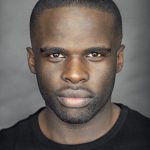Theatre Maker Urbain Hayo talks about his latest show Custody!

We now live in an era where we ourselves are the reporters/camera operators/documentarians. We simply take out our phone, record a video clip, share it on video sharing sites and social media and in a matter of seconds that slice of history goes viral. It’s this tech advancement that has really awakened individuals into the injustices happening by the police on innocent civilians; in particular police brutality and stop and search. These issues effecting black males have been happening for decades, however it’s only now that it is becoming a talking point. Artist and performer Urbain Hayo knows all to well about the repercussions of these injustices and has instilled this into his debut show Custody. Read on to find out more about the topical show here.
Hi Urbain! You’ll be performing Custody at the Ovalhouse Theatre from the 28th March. How are you feeling ahead of the run?
I’m feeling very excited about the run but also nervous because I don’t know how people are going to receive it. It’s my first play that I’ve created and produced, and that I will also be performing in professionally. There’s a lot of responsibility that comes with creating and producing the show and I’m learning a lot. It’s a lot of pressure creating and performing at the same time but I have a great team around me who are really helping me.
Custody is extremely topical, highlighting the moments leading and proceeding a young black male’s time in custody. What in particular motivated you to create this piece?
What motivated me to create the piece were my experiences of being stopped and searched and seeing how that small situation demoralises you and leaves you feeling powerless; how they touched you, how they spoke to you and how it can easily escalate. It was also influenced by a documentary called Injustice which highlighted the deaths in police custody throughout history in the UK and this helped me to see things in perspective and to understand how my experience in modern times is connected to the past. I thought I’d create a piece 4 years ago, so it wasn’t topical at the time but it’s good that people are becoming aware of it through different means.
You’ve teamed up with playwright Tom Wainwright to create Custody. Can you explain how you both created the piece?
I’m an artist but I’m dyslexic so when it comes to writing things I have to collaborate with people who can help me bring the vision to life and who can add to that vision. The collaboration with Tom Wainwright was great and challenging too. Because he’s white he was conscious about writing about the experiences of black people first hand so we really had to collaborate and come together. He had to come into my experience and really explore that and that really helps to bring up the question of racism and how we deal with it; having to deal with my experience as a young black man and write about it in such an amazing way. We really managed to achieve something great in terms of empathy.
The journey in bringing Custody to the stage has been extremely collaborative, and has witnessed you work with the likes of director Gbemisola Ikumelo, choreographer Cindy Claes and dramaturge John Russell Gordon. How did these collaborations materialise?
Gbemi is the artist that discovered me and really taught me how to create ideas and how to be an artist, and that involved movement with Cindy as they work together as a team. I saw them work together and they really pushed me and want the best of me. They’re the best artists I’ve ever worked with. My style is quite spiritual and abstract so I need to have people who can understand those concepts. I believe them all to be geniuses so I’m honoured to be working with them on a play that I created.
What would you like for audience members to take away from the show?
I would like audience members to take way that this play is based on real life events and to realise that black men are dying from police encounters and when they do die, the police officers who might have killed them are not held accountable. When black people interact with police, or the criminal justice system, or any institution, their lives are valued less because they are black.
Do you believe that the UK theatre industry is providing enough opportunities for more stories like these to be told?
I don’t feel that the theatre industry is set up to tell stories like these. Most people who are writers are white and middle class, most directors are white and middle class, most people who are leaders in theatres are middle class and white so that’s the narrative that’s told – the white middle class experience – it’s an effort to tell stories like this in fringe theatres but you wouldn’t necessarily see it on a national stage.
Who and/or what inspire you as a theatre maker?
I’m inspired by all different concepts of arts and art forms, but my favourite playwright is Gbemi Ikumelo, Dennis Kelly, and Tom Wainwright of course, because they write about political things but really make it orientated to the human experience. Not preaching but making people focus on the human experience.
What advice would you give to aspiring theatre makers?
Go out meet as many people, do as many courses as you can, talk and write to as many people, and create from now don’t wait.
Questions by Lucy Basaba.
Custody is currently showing at the Ovalhouse Theatre until Saturday 8th April. For more information on the production, visit here…


Leave a Comment